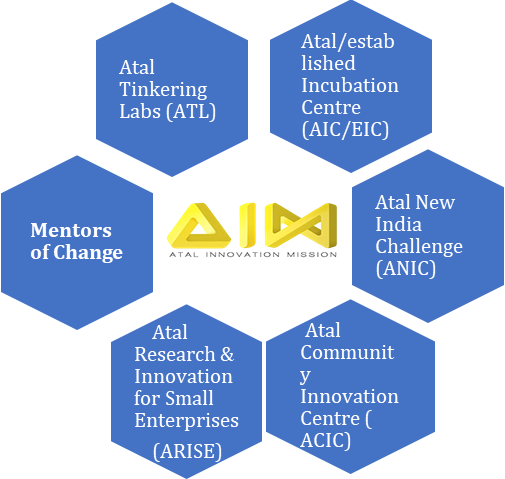Vernacular Innovation Program: NITI Ayog | 23 Dec 2021
For Prelims: Vernacular Innovation Program, Atal Innovation Mission, Eighth Schedule
For Mains: VIP and its importance in overcoming the barriers of language and empowering innovators. Government Efforts in Creating an Innovation Ecosystem in India.
Why in News
Recently, Atal Innovation Mission (AIM), NITI Aayog has launched Vernacular Innovation Program (VIP), to enable innovators and entrepreneurs to have access to the innovation ecosystem in 22 scheduled languages.
Key Points
- About:
- VIP is an initiative to lower the language barrier in the field of innovation and entrepreneurship such that it will systematically decouple creative expressions and languages of transaction.
- To build the necessary capacity for the VIP, AIM has identified and will be training a Vernacular Task Force (VTF) in each of the 22 scheduled languages.
- Each task force comprises vernacular language teachers, subject experts, technical writers, and the leadership of regional Atal Incubation Centers (AICs).
- Significance:
- It will be a stepping stone in the journey of the Indian innovation and entrepreneurship ecosystem which will cement the cognitive and design thinking attitude in young and aspiring minds.
- It will assist India in building a strong local network of design experts and innovation practitioners.
- It will help in overcoming the barriers of language and empower innovators in the farthest areas of the country.
- It will create equal opportunity for the vernacular innovators who represent the staggering 90% of Indian population.
- As per 2011 census, only 10.4% of Indians speak English, most as their second, third, or fourth language.
- Only 0.02% of Indians spoke English as their first language.
- By providing access to learning in one’s language and culture, AIM looks forward to enriching the local, regional, national and global innovation pipelines.
- Other Initiatives Related to Innovation/Entrepreneurship:
Atal Innovation Mission
- About:
- AIM is Government of India’s flagship initiative to promote a culture of innovation and entrepreneurship in the country. It has been set up by the NITI Aayog.
- Objective:
- To develop new programmes and policies for fostering innovation in different sectors of the economy, provide platform and collaboration opportunities for different stakeholders, create awareness and create an umbrella structure to oversee the innovation ecosystem of the country.
- Initiatives Undertaken:
- Major Achievement:
- AIM’s initiatives have played an important contributory role in the advancement of India from a position of 81 in the Global Innovation Index in 2015 to a position of 48 in 2020.
Eighth Schedule
- It lists the official languages of the republic of India. Part XVII of the Indian constitution deals with the official languages in Articles 343 to 351.
- However, it can be noted that there is no fixed criteria for any language to be considered for inclusion in the Eighth Schedule.
- The Eighth Schedule to the Constitution consists of the following 22 official languages:
- Assamese, Bengali, Gujarati, Hindi, Kannada, Kashmiri, Konkani, Malayalam, Manipuri, Marathi, Nepali, Oriya, Punjabi,Sanskrit, Sindhi, Tamil, Telugu, Urdu, Bodo, Santhali, Maithili and Dogri.
- Of these languages, 14 were initially included in the Constitution.
- Sindhi language was added by the 21st Amendment Act of 1967.
- Konkani, Manipuri, and Nepali were included by the 71st Amendment Act of 1992.
- Bodo, Dogri, Maithili, and Santhali were added by the 92nd Amendment Act of 2003 which came into force in 2004.

